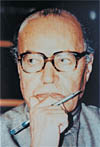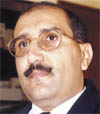Prof. Annmarie Schimmel: “Most Westerners fail to recognize the difference between Islamic traditionalism and fundamentalism.” [Archives:1997/44/Interview]
Professor Annemarie Schimmel is a German orientalist of a worldwide renown. Born in 1922 in Erfurt, Germany, she became infatuated with the Orient at the tender age of 15. She studied Arabic, Persian, Turkish, and Islamic art at the University of Berlin. In 1941, at the age of 19, Schimmel got her Ph.D. in Arabic literature and Islamic art from the University of Berlin. Five years later, she received her Habilitation degree in the history of religions from the University of Marburg. Up to her retirement in 1992, Schimmel occupied several high academic posts in various universities around the world. For a quarter of a century, she held the post of professor of Indo-Muslim Culture at the famous Harvard University. Being retired does not mean that she has stopped her academic research. In addition to a busy schedule of lecture and seminar tours around the world, Schimmel is currently an honorary professor at the University of Bonn. The various, highly esteemed honors and accolades heaped on Schimmel include the Great Order of Merit (Germany), the Hilal-i Imtiaz (Pakistan), the Order of Science and Art (Egypt), the Turkish Order of Merit, the Golden Hammer-Purgstall Medal (Austria), the Johann Heinrich Prize (Germany), and several other awards and medals from Pakistan, the USA, and Turkey. During her recent visit to Yemen, Bin Sallam of Yemen Times met Prof. Schimmel and filed this interesting interview.
Q: You visited Hadhramaut and other areas. How do you see these places? A: I was interested in Hadhramaut since I was a child because I read a wonderful book with photographs from Hadhramaut and that was a long time ago. When I came here in 84 it was not possible to visit Hahramaut. Yemen was not yet unified. I am very happy to see it now. I found many interesting things and met interesting people. We had good talks in Seioun and Tareem. It is a place where I really would like to stay for more time.
Q: Have you visited Zabeed? A: That was during my first visit in ’84. One of my students from Harvard wrote here doctorate dissertation about the medieval history of Zabeed. So we went together. I also visited Marib last time. I have seen a number of many interesting places. During this visit I also saw Thula and Kawkaban.
Q: What are your impression of Yemen? A: I am very very impressed how Sanaa and Yemen in general have developed. When I came for the first time in 84 it was still a comparatively small place. But it is growing tremendously. I see very much progress here.
Q: What have you discussed in your meetings with Yemeni intellectuals? A: We usually discuss questions of the dialogue between East and West. Is it necessary to speak of a clash of culture? I always say it is not necessary because we have to learn about each other and we have to foster a better understanding between the Western European and the Americans, on the one hand, and the Muslims all over the world on the other. So I don’t believe in a clash of cultures.
Q: Yemen is a traditional society, but not a fundamentalist one. Does the West make the difference? A: This is a very interesting question because many Westerners, especially the media, do not know the difference. For them, every Muslim is a fundamentalist which of course is nonsense. They cannot discern between the various aspects of Islam. We just have some German newspaper people here. I think after their visit they’ll understand the difference very well between traditionalists and fundamentalists. These are completely different things.
Q: Yemen has a basic Eastern identity. Now it is trying to learn Western values. How do you see the results? A: I think that we all have to learn from each other. A traditional culture should not exclude learning from another part of the world. I am, for instance, impressed to see all the satellite things on roof tops and modern technology is here. But I don’t say that this is contradictory. Every country has to develop in technology. Otherwise, the difference would be too big. But I know so many traditionalist Muslims who remained faithful to the values of their culture and yet have no difficulty in using modern gadgets which we can see here. I think what else one can do: We cannot ride on a camel all through Yemen when we are in a hurry. It is not only the case in Yemen, but in many other Arab countries as well.
Q: Which Muslim country has achieved a harmonious mix between East and West? A: I have not visited all Muslim countries, but I see how they are striving I would say that Morocco is a country which seems to be rather successful.
Q: What was Yemen’s most important contribution to the Islamic civilization? A: There are many contributions made by Yemen. For example, the geographical work by Al-Hamdani and Al-Ikleel. One important aspect of Yemeni culture is that it was a country in which many people from East and West settled. For instance, I am not familiar with all the details of history, if we think of the history of Zabeed, it has been for many centuries and it is now, one of the most important centers of Islamic learning . Not only people who went pilgrimage to Mecca remained there on their way to Mecca and back but people from India and everywhere settled in Zabeed for sometime. I was in Zabeed during my first visit. I am very impressed by the history that place. So this is one aspect, I would say. The second aspect is that there had always been important exchange of population between Yemen, including Hadhramaut of course, and the Indian subcontinent. Since I specialized in the history of the subcontinent, I constantly run into names which show that this or that scholar hailed from Yemen and has settled in India and has contributed to the Islamic civilization there.
Q: What has this visit added to you? A: It has added, first of all, more knowledge about the country itself. Second, I have seen many places which I could not visit last time such as Hadhramaut and Jibla, a wonderful place. I think the Yemenis should be very proud of their history where they have rulers like Queen Arwa who was an outstanding lady. Western visitors often forget that there were great queens in the world of Islam. And Arwa was certainly one of the most important ones. This visit has also given me the opportunity of meeting many Yemeni friends and of enjoying the traditional Yemeni hospitality. We were lost on the way because something occurred that did not allow us to continue after these terrible rains. All of a sudden, someone who had never heard of us and whom we didn’t know, offered us his house to stay there overnight . It was as if it were the easiest thing in the world. I must say all the hospitality I have enjoyed here during the 10 days of my visit has deeply impressed me.
Q: What are your future projects? A: I am expecting a proof of one of my books to come out soon. Then I have to go to Munich, Belgium, Turkey and England for lectures. All that is to be done before Christmas. As long as my health is good, I’ll continue writing and lecturing on Islamic civilization, literature and art. This is my life.
Q: How have you dealt with the role of women in Islam? A: I have written about women not only in Islam, but on the role of women in religion in general. My last book deals with the role of women in Islamic spirituality. I think that it is very important that we don’t only concentrate on the dhahir (appearance) but look at the batin (essence) as well.
Q: A large proportion of Yemeni women are illiterate. How can they play any role at all within these conditions? A: The question of women’s illiteracy is something that is not restricted to Yemen. We find it, for instance, in Pakistan as well and other parts of the world. The situation in Latin America is not much different, either. I think what is really important is that women should have a basic education that enables them to read, perhaps not even to write, but to read and to see what is going on. From my own experience I know that Muslim women when given the opportunity to learn something are extremely intelligent and very strong. The moment they are given freedom to develop, they are wonderful, hard working, and really care for what they are doing. The moment you give them basic education, then enable them if they want to go on, I think you’ll have a very strong part of your population that’ll help in the development of your country. I trust the Muslim women very much because I have met wonderful women, even illiterate ones. I have learnt a lot from them because they have all the energy and all the strength of heart in themselves. It was not only something that comes from the brain or the intellect. Once they are given the opportunity to do something to learn something, they’ll do it from the bottom of their hearts. You have examples here in Yemen. You are in a certain way more progressive than many other countries which have not given women as many rights as you have. The women whom I have met have impressed me very much. I hope that primary education for women and things like that will spread through the country. That will help society to flourish in the future.
Q: Is there any question you would like to bee asked and I haven’t asked you? A: The questions you asked were more of a general nature. I could tell you a lot about my experience in Pakistan, Turkey, Afghanistan, Iran. I have been to all these places. I am going every year to several Muslim countries. I have read more than 90 books on topics of Islamic culture, civilization, translated poetry from Arabic, Persian, Turkish, Urdu, Sindi, etc.
Q: Any last comment? A: These 10 days in Yemen were really a wonderful experience. Despite the strange weather which you have arranged for me – instead of sunshine I find rain, I have seen much and I am very happy to see how the country has progressed in the last 13 years. I hope when I come again, perhaps not after 13 years, but earlier, I see that this movement continues in strength I am very grateful to all my Yemeni friends from the Ministry down to the simple people in the villages. They have shown me so much friendship and received me with so much warmth.
——
[archive-e:44-v:1997-y:1997-d:1997-11-03-p:./1997/iss44/intrview.htm]


